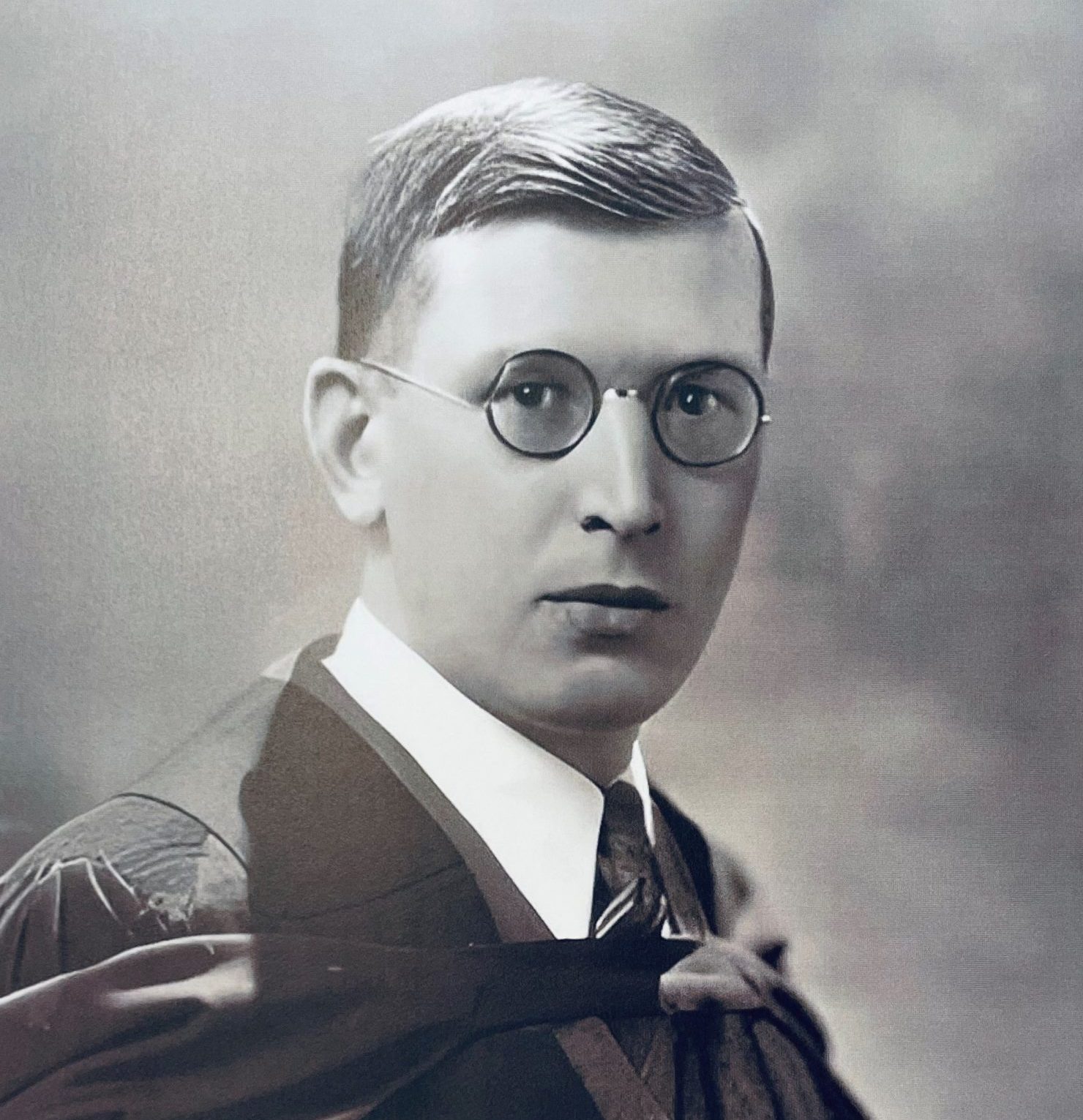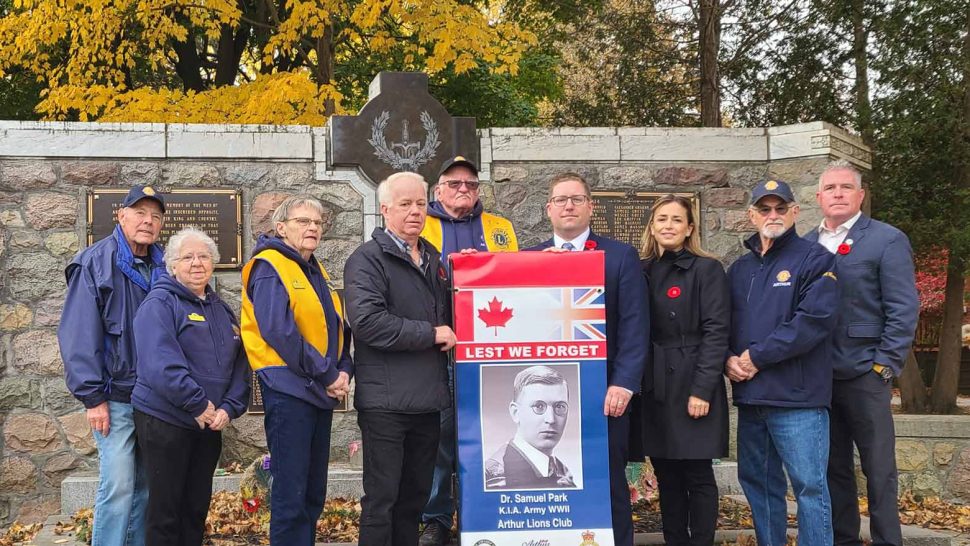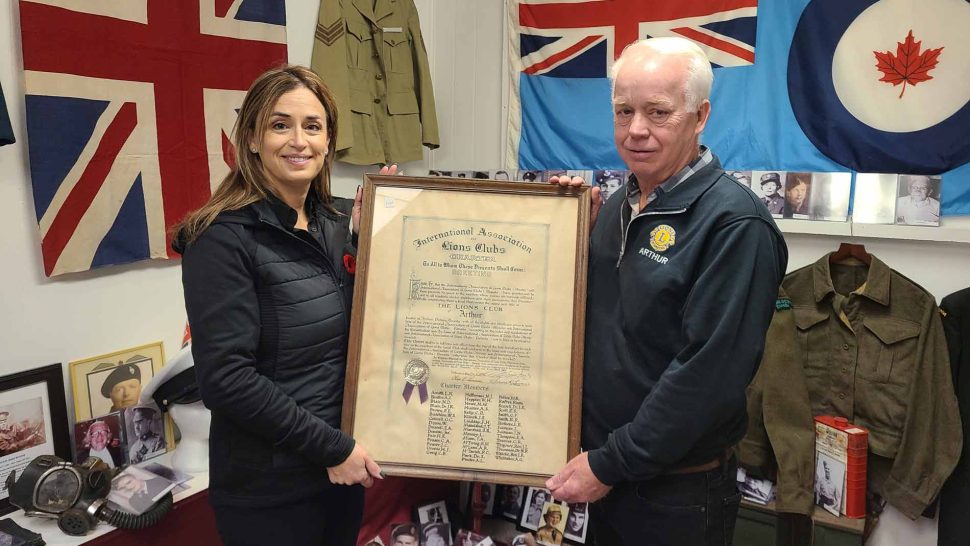ARTHUR – Dr. Samuel Park was a charter member of the Arthur Lions Club, a Jewish immigrant from Russia, one of just a handful of doctors in Arthur’s community in the late 1930s, and a lieutenant in the Second World War.
On Oct. 25, the Arthur Lions Club honoured Park with a small ceremony at the cenotaph and by hanging a banner on Arthur’s main street.
“His dedication to both community and country made a lasting impression,” said Lions Club president Mike Marshall.
Park was the first Arthur Lions Club member “to make the ultimate sacrifice during World War II,” he said.
“Let the banner remind us all of the profound impacts that one person, one club and one community can have.”
Wellington North councillor Steve McCabe and Perth-Wellington MP John Nater also spoke during the event.
“The motto of the Lions Club is ‘We serve,’ and no one embodies that more than Dr. Samuel Park,” Nater said.
It’s because of the “courage and sacrifice of people like Dr. Samuel Park” that Arthur is known as Canada’s most patriotic village, he said.
And it’s important for people to remember “each person who served was a real person who had a family, had loved ones, and had a life,” he added.
Park’s background
Park was born in Bobroisk, Russia in April 1907 to Max and Margaret Parkovnick, according to the Canadian Virtual War Memorial. He and his family immigrated to Québec while Park was a child, and he attended Earl Grey School, Montreal High School and McGill University, according to the Canadian Jewish Congress.
His brother, Israel Parkovnick, also served in the army, states David Rome in Canadian Jews in World War II, a memorial book compiled for the Canadian Jewish Congress.
McGill’s records show Park graduated with a medical degree in 1934. After graduating, he worked as an Arthur-area doctor for about three years.

Dr. Samuel Park. Submitted photo
Original Arthur Lions
On Nov. 21, 1939, less than three months after the onset of the Second World War, 46 men, including Park, joined together to launch the Arthur Lions Club.
Marshall described the club’s charter members as “visionary.”
They were “a professional bunch,” Arthur historian Jeff McKee told the Advertiser, including business owners, teachers, a high school principal, a post master, a newspaper editor, doctors and politicians.
Six were First World War veterans, and seven went on to serve in the Second World War.
The Mount Forest Lions Club launched the year before Arthur’s, and sponsored the Arthur club, Marshall said.
“The early focus of the club and all of its charter members was the war effort,” Arthur Lions Club secretary and second vice president Jen McDougall told the Advertiser. “They played an instrumental role in our village’s designation as Canada’s Most Patriotic Village.”
Park’s service
Park volunteered for active service early in the war and was posted to Military District No. 1 (renamed Canadian Forces Base London) in London, Ontario on Sept. 10, 1940, according to Arthur Lions officials.
He was appointed to the Canadian Active Service Force as a conducting medical officer in September 1940, states a May 1941 clipping from the Owen Sound Sun Times.
The same clipping states Park was “believed lost at sea due to enemy action.”
The Department of National Defence announced Park was reported missing and presumed dead on May 5, 1941, after the troopship S.S. Nerissa sank, McGill archives state.
According to the Maritime Museum of British Columbia, (MMBC) German submarine U-552 sank S.S. Nerissa on April 30, 1941.
According to MMBC, 207 men died when the Nerissa sank, including 83 Canadian military personnel; there were 84 survivors.
Park was 34 years old when he died, and the voyage was his fifth trip overseas, the Canadian Jewish Congress states.
After Park’s death, he was promoted from lieutenant to captain, according to McGill archives. His name is inscribed on the Arthur cenotaph as well as the Halifax Memorial in Nova Scotia, the Jewish Canadian Veterans Memorial in Toronto’s Mount Sinai Memorial Park and the War Monument in Baron De Hirsch Cemetery, a Jewish cemetery in Montréal.






